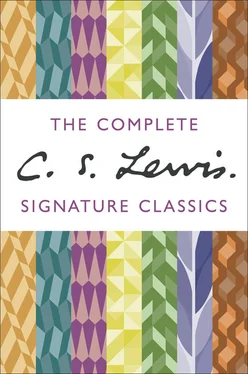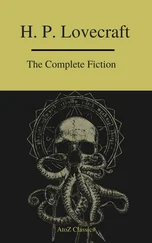‘Niceness’—wholesome, integrated personality—is an excellent thing. We must try by every medical, educational, economic, and political means in our power to produce a world where as many people as possible grow up ‘nice’; just as we must try to produce a world where all have plenty to eat. But we must not suppose that even if we succeeded in making everyone nice we should have saved their souls. A world of nice people, content in their own niceness, looking no further, turned away from God, would be just as desperately in need of salvation as a miserable world—and might even be more difficult to save.
For mere improvement is not redemption, though redemption always improves people even here and now and will, in the end, improve them to a degree we cannot yet imagine. God became man to turn creatures into sons: not simply to produce better men of the old kind but to produce a new kind of man. It is not like teaching a horse to jump better and better but like turning a horse into a winged creature. Of course, once it has got its wings, it will soar over fences which could never have been jumped and thus beat the natural horse at its own game. But there may be a period, while the wings are just beginning to grow, when it cannot do so: and at that stage the lumps on the shoulders—no one could tell by looking at them that they are going to be wings—may even give it an awkward appearance.
But perhaps we have already spent too long on this question. If what you want is an argument against Christianity (and I well remember how eagerly I looked for such arguments when I began to be afraid it was true) you can easily find some stupid and unsatisfactory Christian and say, ‘So there’s your boasted new man! Give me the old kind.’ But if once you have begun to see that Christianity is on other grounds probable, you will know in your heart that this is only evading the issue. What can you ever really know of other people’s souls—of their temptations, their opportunity, their struggles? One soul in the whole creation you do know: and it is the only one whose fate is placed in your hands. If there is a God, you are, in a sense, alone with Him. You cannot put Him off with speculations about your next door neighbours or memories of what you have read in books. What will all that chatter and hearsay count (will you even be able to remember it?) when the anaesthetic fog which we call ‘nature’ or ‘the real world’ fades away and the Presence in which you have always stood becomes palpable, immediate, and unavoidable?
In the last chapter I compared Christ’s work of making New Men to the process of turning a horse into a winged creature. I used that extreme example in order to emphasise the point that it is not mere improvement but Transformation. The nearest parallel to it in the world of nature is to be found in the remarkable transformations we can make in insects by applying certain rays to them. Some people think this is how Evolution worked. The alterations in creatures on which it all depends may have been produced by rays coming from outer space. (Of course once the alterations are there, what they call ‘Natural Selection’ gets to work on them: i.e. the useful alterations survive and the other ones get weeded out.)
Perhaps a modern man can understand the Christian idea best if he takes it in connection with Evolution. Everyone now knows about Evolution (though, of course, some educated people disbelieve it): everyone has been told that man has evolved from lower types of life. Consequently, people often wonder ‘What is the next step? When is the thing beyond man going to appear?’ Imaginative writers try sometimes to picture this next step—the ‘Superman’ as they call him; but they usually only succeed in picturing someone a good deal nastier than man as we know him and then try to make up for that by sticking on extra legs or arms. But supposing the next step was to be something even more different from the earlier steps than they ever dreamed of? And is it not very likely it would be? Thousands of centuries ago huge, very heavily armoured creatures were evolved. If anyone had at that time been watching the course of Evolution he would probably have expected that it was going to go on to heavier and heavier armour. But he would have been wrong. The future had a card up its sleeve which nothing at that time would have led him to expect. It was going to spring on him little, naked, unarmoured animals which had better brains: and with those brains they were going to master the whole planet. They were not merely going to have more power than the prehistoric monsters, they were going to have a new kind of power. The next step was not only going to be different, but different with a new kind of difference. The stream of Evolution was not going to flow on in the direction in which he saw it flowing: it was in fact going to take a sharp bend.
Now it seems to me that most of the popular guesses at the Next Step are making just the same sort of mistake. People see (or at any rate they think they see) men developing great brains and getting greater mastery over nature. And because they think the stream is flowing in that direction, they imagine it will go on flowing in that direction. But I cannot help thinking that the Next Step will be really new; it will go off in a direction you could never have dreamed of. It would hardly be worth calling a New Step unless it did. I should expect not merely difference but a new kind of difference. I should expect not merely change but a new method of producing the change. Or, to make an Irish bull, I should expect the next stage in Evolution not to be a stage in Evolution at all: should expect that Evolution itself as a method of producing change will be superseded. And finally, I should not be surprised if, when the thing happened, very few people noticed that it was happening.
Now, if you care to talk in these terms, the Christian view is precisely that the Next Step has already appeared. And it is really new. It is not a change from brainy men to brainier men: it is a change that goes off in a totally different direction—a change from being creatures of God to being sons of God. The first instance appeared in Palestine two thousand years ago. In a sense, the change is not ‘Evolution’ at all, because it is not something arising out of the natural process of events but something coming into nature from outside. But that is what I should expect. We arrived at our idea of ‘Evolution’ from studying the past. If there are real novelties in store then of course our idea, based on the past, will not really cover them. And in fact this New Step differs from all previous ones not only in coming from outside nature but in several other ways as well.
(1) It is not carried on by sexual reproduction. Need we be surprised at that? There was a time before sex had appeared; development used to go on by different methods. Consequently, we might have expected that there would come a time when sex disappeared, or else (which is what is actually happening) a time when sex, though it continued to exist, ceased to be the main channel of a development.
(2) At the earlier stages living organisms have had either no choice or very little choice about taking the new step. Progress was, in the main, something that happened to them, not something that they did. But the new step, the step from being creatures to being sons, is voluntary. At least, voluntary in one sense. It is not voluntary in the sense that we, of ourselves, could have chosen to take it or could even have imagined it; but it is voluntary in the sense that when it is offered to us, we can refuse it. We can, if we please, shrink back; we can dig in our heels and let the new Humanity go on without us.
(3) I have called Christ the ‘first instance’ of the new man. But of course He is something much more than that. He is not merely a new man, one specimen of the species, but the new man. He is the origin and centre and life of all the new men. He came into the created universe, of His own will, bringing with Him the Zoe , the new life. (I mean new to us, of course: in its own place Zoe has existed for ever and ever.) And He transmits it not by heredity but by what I have called ‘good infection’. Everyone who gets it gets it by personal contact with Him. Other men become ‘new’ by being ‘in Him’.
Читать дальше












